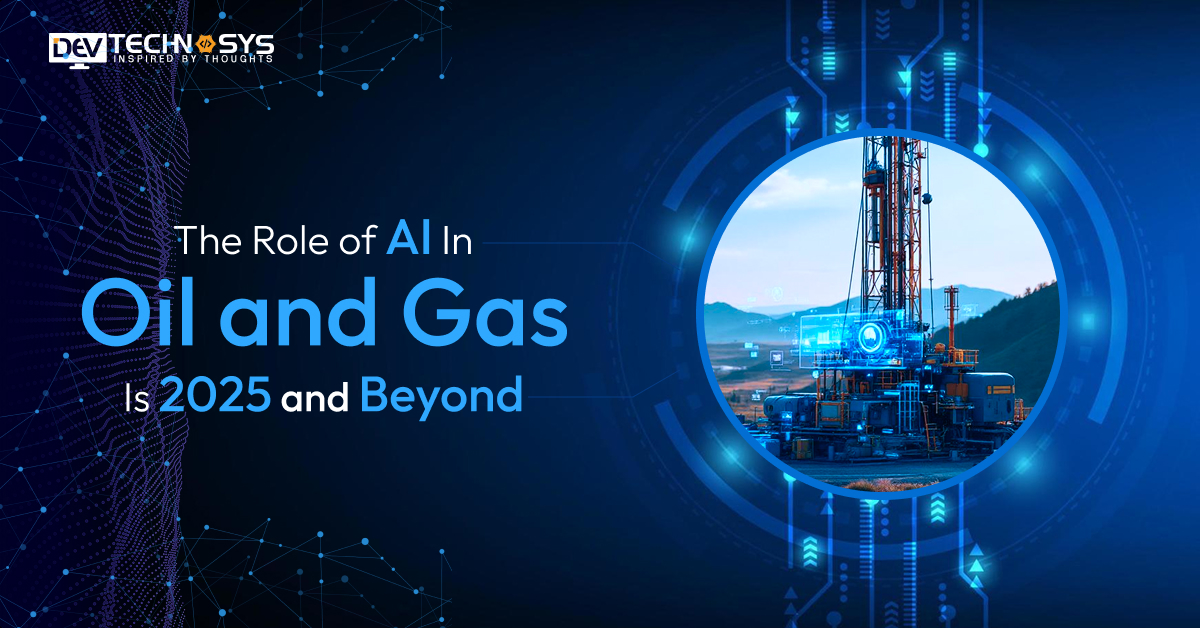Artificial Intelligence (AI) has been revolutionising the oil and gas industry, using its immense potential to drive innovation and efficiency. The traditional method of oil exploration was costly and time-consuming. However, with AI’s advanced algorithms and seismic data analytics, solving organizational challenges has become easier.
AI plays a huge role in the oil and gas industry. It entails automating operations, enabling data-driven decision-making, and predicting the likelihood of failures before they occur. The use of AI in the oil and gas sector saves time and resources, and also reduces the environmental impact.
Furthermore, AI and IoT integration in oil and gas offers predictive maintenance as a game-changer in drilling operations, continuously monitoring equipment to preempt failures and minimize downtime. In today’s blog we will discuss the role of AI in oil and gas sector, and witness the top technology trends in the oil and gas industry in UAE. So, without further ado, let’s begin!
What’s Driving AI Adoption in Oil and Gas?
The oil and gas industry operates in an environment where safety, efficiency, and precision are non-negotiable. However, these tasks and operations come with a set of challenges. Frequently rising and falling prices impact financial stability, complex exploration processes increase the demand for operations. Not only that, the rising concerns regarding sustainability shape public and regulatory expectations.
AI in the oil and gas sector is uniquely equipped to help address these crucial points. Nowadays, all top oil and gas software development companies are incorporating AI and machine learning technology to create advanced oil & gas Software to help the oil and gas industry leaders.
AI and IoT integration in oil and gas is no longer just a technological upgrade. It’s becoming a successful strategy for lowering costs and maintaining relevance in an increasingly competitive energy market.
UAE Oil & Gas Upstream Market Report
- Crude oil is among the most in-demand commodities in the world, and demand is expected at more than 104 million barrels per day.
- The oil and gas upstream market size of the United Arab Emirates (UAE) is projected to rise from USD 9.77 billion in 2025 to USD 12.59 billion by 2030, reflecting a CAGR of 5.2% during this period.
- With over 13.07% of the Middle East’s oil production, the UAE produced 4.02 million barrels per day in 2022, holding 11.7% of the region’s proven reserves as of 2020.
- Global oil stocks rose for a third consecutive month, by 32.1 mb in April to 7 717 mb, led by builds in crude oil inventories in the non-OECD.
AI Applications Across the Value Chain
AI in the oil and gas industry is a blessing for enterprises. In today’s era, many professionals offer AI consulting services to oil and gas companies, thanks to the immense benefits that AI technology provides.
AI integrates seamlessly across the oil and gas value chain, from exploration to refining. In upstream operations, AI-powered algorithms analyze seismic data to identify optimal drilling locations, helping reduce exploration risks and improve decision-making.
Midstream activities benefit from predictive maintenance solutions that monitor pipelines and storage facilities. Custom AI solutions for oilfield operations enable the early detection of potential failures and minimize downtime.
Downstream, Enterprise AI for oil and gas UAE enhances refining and distribution processes through real-time demand forecasting and process optimization, ensuring a smoother supply chain.
According to top companies that provide oil & gas software development services in Dubai, integration of AI across exploration, transportation, and distribution can offer greater operational efficiency for executives while reducing costs across their value chain.
Benefits of AI in Oil And Gas Operations
According to the experts who provide Artificial Intelligence development services, there are a wide range of benefits of using AI technology in gas operations:
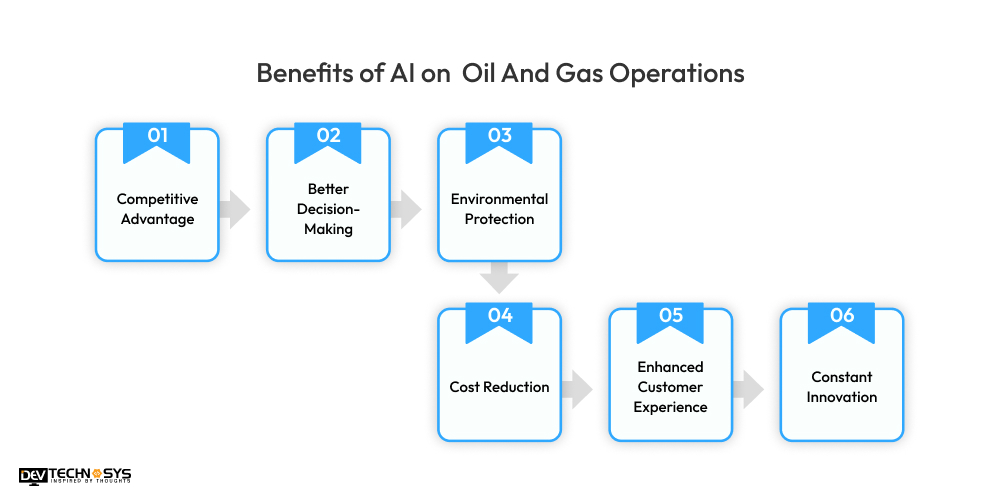
-
Competitive Advantage
The AI helps the oil & gas industry by finding oil faster, reducing waste, and improving planning—giving them an edge over others in a highly competitive industry.
-
Better Decision-Making
According to the Middle East’s top oil and gas Software developers, it is beneficial to include AI in the oil and gas software because AI quickly analyzes vast amounts of data to help teams make smarter choices about drilling, safety, and production without guessing.
-
Environmental Protection
AI tools like advanced analytics for oil and gas UAE detect gas leaks, spills, and pollution early, helping protect the environment and follow safety and government rules.
-
Cost Reduction
According to experts who provide Android app development services in UAE, by predicting problems before they happen and automating tasks, AI helps save money on repairs, labor, and energy use.
-
Enhanced Customer Experience
According to the top experts in providing oil & gas software development services, AI chatbots and tools offer quick support, accurate information, and faster responses, making it easier for customers to get help.
-
Constant Innovation and Improvement
AI allows companies to keep improving how they work, making operations safer, faster, and more efficient through learning and technology. According to a top iOS app development company in Dubai, the constant innovation that AI brings significantly benefits the oil and gas industry.
Top 10 Mobile Apps in Oil & Gas Industry
The below table showcases the list of top 10 mobile apps in oil & gas industry. Let’s take a look at them:
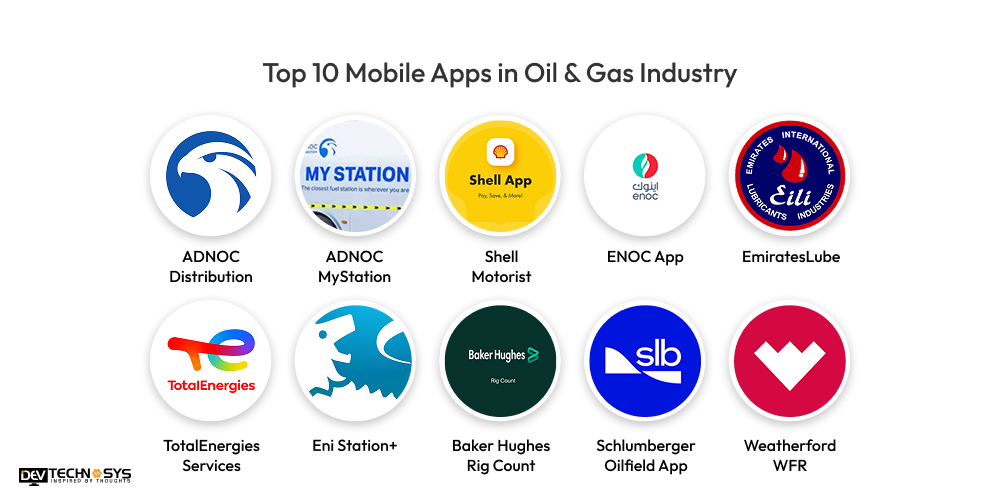
App Name |
Purpose |
Platform Availability |
Developer / Company |
| ADNOC Distribution | Fuel station locator, top-up cards, payments | iOS, Android | ADNOC (Abu Dhabi National Oil Co.) |
| ADNOC MyStation | Refueling, car services, digital wallet | iOS, Android | ADNOC |
| Shell Motorist | Find stations, rewards, fuel insights | iOS, Android | Shell Global |
| ENOC App | Fuel payments, Zoom stores, loyalty rewards | iOS, Android | Emirates National Oil Company |
| EmiratesLube | Oil product catalog & request quotations | Android | EmiratesLube |
| TotalEnergies Services | Fuel station finder, payment, service locator | iOS, Android | TotalEnergies UAE |
| Eni Station+ | Track fuel expenses, locate stations | iOS, Android | Eni |
| Baker Hughes Rig Count | Track global rig data, including MENA | iOS, Android | Baker Hughes |
| Schlumberger Oilfield App | Data access, reporting, field operations | iOS, Android | Schlumberger |
| Weatherford WFR | Field service support, real-time alerts | iOS, Android | Weatherford |
AI in All Its Forms For Oil And Gas Industry
These forms of AI in oil and gas industry captures the value from data:
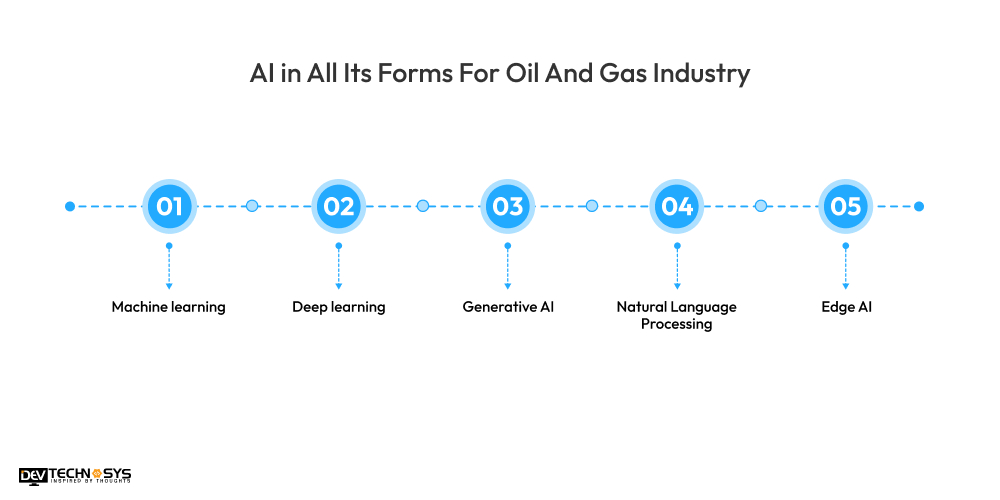
-
Machine learning:
It analyzes data for recognizing patterns to predict the outcomes and, overall, optimize oil and gas operations across the value chain. Machine learning is commonly used in reservoir exploration, detecting faults and errors, and drilling operations.
-
Deep learning:
This is the more advanced type of ML. Deep learning uses neural networks to process enormous publicly available data from seismic surveys performed by government agencies and identify complex information within it.
-
Generative AI:
Learning from data sets that already exist, gen AI systems create, for example, new data samples, emergency instructions, or smart summaries. Hire AI developers for the energy industry to implement these technologies into your oil and gas software system.
-
Natural Language Processing (NLP):
AI and IoT integration in oil and gas includes incorporating NLP and computer vision. This AI solution Interprets visual data and human language for generating tasks like report and quality control.
-
Edge AI:
This AI solution processes data locally on IoT devices without depending on cloud storage or internet connectivity. This greatly helps in altering machinery settings, tracking sensor readings, collecting seismic data, and continuously monitoring operations and safety conditions remotely.
Top 10 Use Cases of AI in Oil Gas Sector
AI in Oil and Gas software helps companies optimize operations, enhance safety, reduce costs, and improve environmental performance by leveraging large amounts of data and information. Here are the top 10 use cases of AI in the Oil & Gas sector:
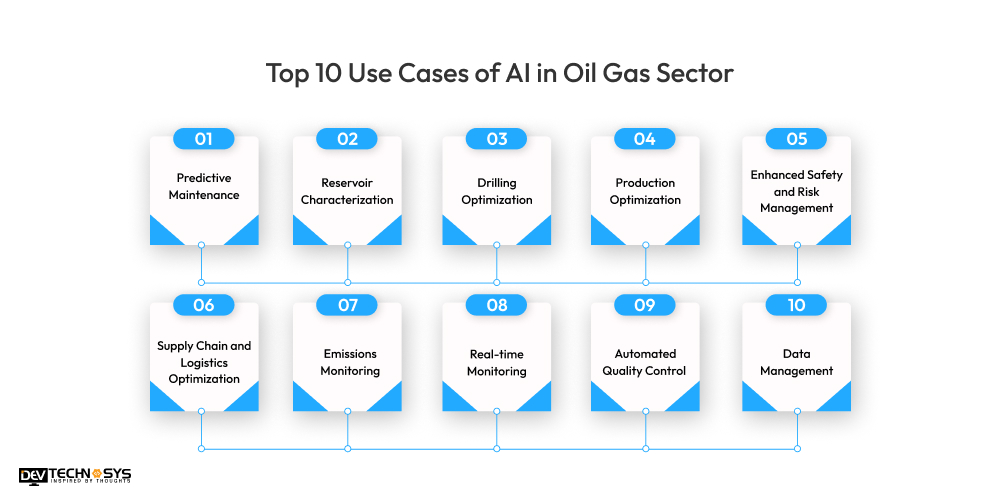
-
Predictive Maintenance:
AI algorithms analyze real-time sensor data from equipment (e.g., pumps, pipelines, drills, turbines) to predict potential failures before they occur. It enables proactive maintenance scheduling, lowering costly downtime, extending the lifespan of equipment, and preventing accidents. Integrating this technology can impact the cost to develop an app, but offer great results.
-
Drilling Optimization and Automation:
AI systems analyze real-time drilling parameters (pressure, flow rates, vibration) to optimize drilling trajectories and speeds. This leads to more efficient operations for drilling, reduced non-productive time (NPT), lower drilling costs, and enhanced safety by predicting hazardous well conditions.
-
Reservoir Characterization and Modeling:
AI and Machine Learning (ML) models analyze vast geological, seismic, and well-log data to create highly accurate and detailed 3D models of subsurface reservoirs. According to experts at a top mobile app development company, this helps in identifying hydrocarbon-rich zones with greater precision, optimizing well placement, and improving recovery rates from existing fields.
-
Production Optimization:
Industrial AI services for oil companies also include production optimization service. The AI helps optimize production standards in real-time. It includes gas lift, water injection, and artificial lift systems, to increase hydrocarbon output with minimum energy consumption. This involves analyzing data from smart wells and adjusting tasks efficiently.
-
Enhanced Safety and Risk Management:
AI-powered computer vision systems can monitor work environments for unsafe behaviors, equipment malfunctions, and unauthorized personnel. AI in Oil and Gas offers risk prediction models analyzing historical incident data, weather, and operational logs to forecast potential hazards.
-
Supply Chain and Logistics Optimization:
AI algorithms improve the predictions for crude oil and refined product demands by analyzing the previous data, market trends, and external factors. It also optimizes transportation routes for pipelines, tankers, and trucks, enhances inventory management, and streamlines procurement processes which leads to cost savings and increased efficiency.
-
Emissions Monitoring and Environmental Compliance:
There are various custom AI solutions for oilfield operations, one of them being emissions monitoring. The constant emission monitoring done by AI powered tools facilities, detect pipeline leaks early, and identify energy waste patterns.
This helps companies meet environmental regulations, reduce their carbon footprint, prevent spills, and accelerate sustainability decisions.
-
Real-time Monitoring and Anomaly Detection:
AI vendors in the oil and gas sector continuously process data from multiple sensors across complex operations to detect subtle irregularities that might point to equipment failure or malfunction, leaks, or inefficient workflow. This allows for immediate response and proactive problem-solving.
-
Automated Quality Control and Process Optimization:
In refineries, AI in oil and gas sector is used to manage blending, cracking, and refining processes to ensure consistent product quality, reduce waste, and optimize energy consumption. AI models can detect cracks in materials, optimize chemical compositions, and predict the behavior of materials under various conditions.
-
Data Management and Decision Support:
Given the enormous volume of data generated in the oil and gas sector, AI, particularly Natural Language Processing (NLP) and Machine Learning, is used to process, analyze, and extract valuable insights from unstructured data. This enables data-driven decision-making across all levels of the organization.
3 Key Steps to start your AI Project in the Oil and Gas Sector
As the oil and gas industry works to stay competitive and sustainable, artificial intelligence (AI) offers powerful tools to boost performance, lower costs, and improve safety. But what is the first step?
According to experts who provide custom software development services, below are the 3 simple and important steps to kick-start your AI journey the right way:
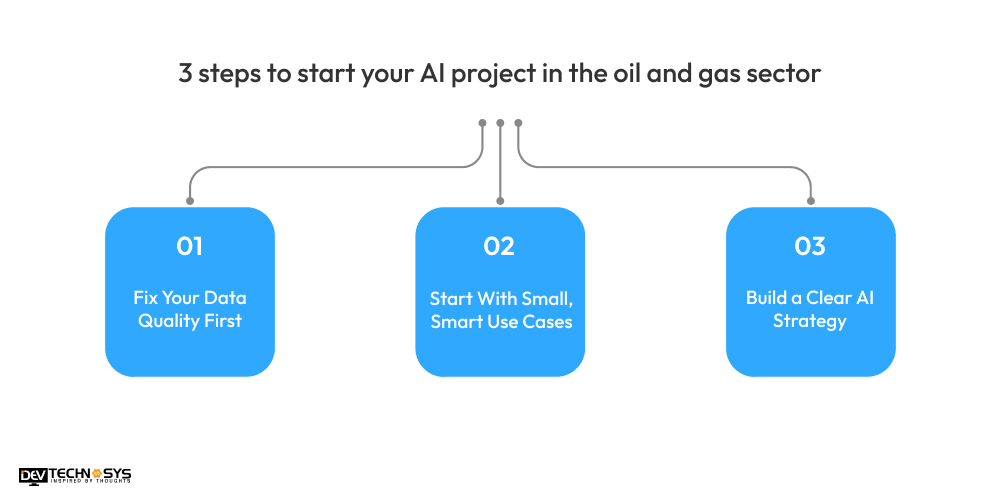
1. Fix Your Data Quality First
Enterprise AI for oil and gas UAE clean, organized, and accurate data to work properly. If your data is messy, AI won’t give you useful results.
Here’s what you can do:
- List all the data you collect (from equipment, sensors, field reports, etc.).
- Check how you collect and store that data, is it complete and easy to use?
- Make sure the data is secure, consistent, and accessible across your organization.
- If needed, bring in experts or train your team in data management and analytics.
Clean and reliable data gives your AI project a strong foundation and lowers the risk of failure. If you are new to this AI or starting your oil & gas business from scratch, it’s better to take AI consulting for oil and gas companies to start your business on the right foot.
2. Start With Small, Smart Use Cases
AI isn’t a magic solution that fixes everything overnight. You need to use it where it makes the most sense. Hire AI developers for the energy industry to get the best results.
Here’s how:
- Choose one or two areas where data is already available, and the impact will be clear, for example, predicting equipment failures or improving drilling accuracy.
- Don’t try to apply AI to the whole company at once. Start small with a pilot project.
- Quick results will help prove the value of AI and get support for larger efforts later on.
According to experts who build successful oil & gas software, you need to focus on high-value use cases that help you gain confidence and learn fast without wasting time or money.
3. Build a Clear AI Strategy
To make AI work across your business, you need a solid plan that encompasses not only technology but also people, processes, and safety.
To build successful oil & gas software, these are the things to include in your plan:
- Compare the cost of each AI project with the benefits it can bring.
- Consider how AI will impact your teams, equipment, and daily operations.
- Use AI responsibly by following ethical and safety guidelines.
- Ensure your data remains clean, secure, and up to date.
- Set up a system to manage and monitor all AI projects and decisions.
A clear strategy makes sure AI helps your business grow and keeps everything running smoothly.
The Future of AI in Oil and Gas: What’s Next?
The oil and gas industry’s embrace of AI is just the first step. As AI technology is constantly advancing, the chances of more advanced and innovative changes is high.
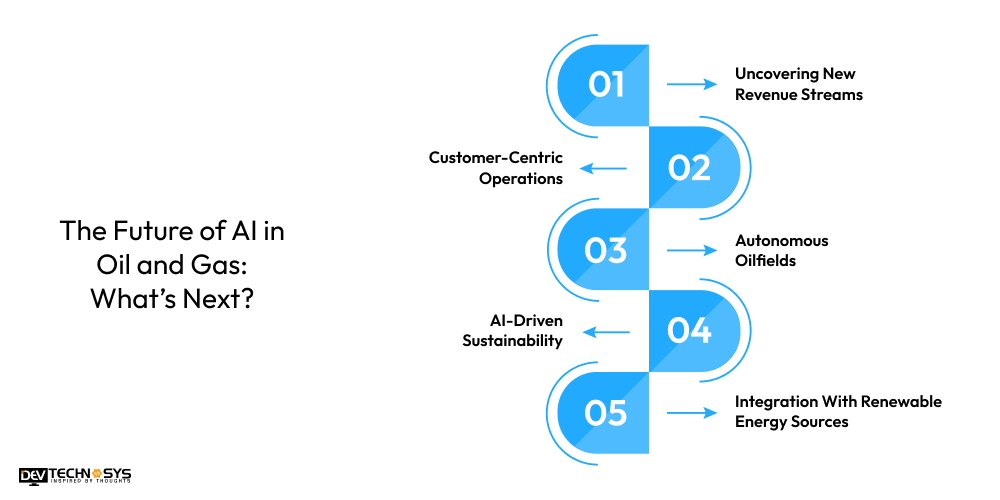
-
Uncovering New Revenue Streams:
With The help of predictive analytics, companies can identify unexplored opportunities in their operations, whether through better resource allocation or introducing new service models.
-
Customer-Centric Operations:
With predictive tools, oil and gas businesses can now accurately address client needs, ensuring better service and delivery. This focus on customer satisfaction creates an advantage in an increasingly crowded marketplace.
-
Autonomous Oilfields
AI will help in identifying and development of unexplored oil fields where equipment are allowed to take real-time decisions with minimal human intervention. Using machine learning and IoT, pressure control, flow optimization, and predictive and more efficient asset maintenance like operations will become easier.
-
AI-Driven Sustainability
Environmental obligation is important for the industry’s future. AI will help monitor emissions, reduce flaring, optimize energy use, and ensure compliance with ESG goals. Smart sensors and real-time analytics will enable faster action against leaks or energy waste.
-
Integration With Renewable Energy Sources
According to the Middle East’s top oil and gas software development agencies, integration with renewable energy sources is shaping the future of the oil and gas industry. As oil and gas companies diversify into wind, solar, and hydrogen, AI will serve as the bridge, helping balance energy loads, forecast output, and manage hybrid grids.
Conclusion
Looking at the near future,it is clear that artificial intelligence (AI) is turning into a strategic requirement for oil and gas firms looking to maintain their sustainability, efficiency, and competitiveness. AI technology is needed to ensure safety, reduce environmental effect, and assist in the making of more intelligent business decisions in 2025 and beyond.
Businesses embracing AI technology now will thrive in the future with operational excellence, while those that wait run the danger of slipping behind in a world that is becoming more data-driven and low-carbon.
If you are a business that wants to build an oil and software with AI integration, then contact experts at Dev Technosys. We are a leading oil & gas software development company that possess the skills and technology to turn your business idea into a fully functional app. So stay tuned for more informative updates.
FAQs
1. How is AI Transforming the Oil and Gas Industry?
AI helps optimize drilling, reduce equipment downtime, improve safety, and make smarter decisions through data-driven insights and real-time analytics.
2. What are Common Use Cases of AI in Oil and Gas?
Popular use cases include predictive maintenance, reservoir modeling, emissions monitoring, supply chain optimization, and automated field operations.
3. Is AI Adoption Costly for Oil Companies?
While AI requires investment, it reduces long-term cost to maintain an app by improving efficiency, minimizing failures, and maximizing resource output across the value chain.
4. How Can AI Improve Safety in Oilfields?
AI-powered wearables and video analytics detect unsafe behaviors, gas leaks, and environmental hazards, helping companies prevent accidents and respond faster.
5. Can AI Support Sustainability Goals in Oil and Gas?
Yes, AI monitors carbon emissions, optimizes energy use, and supports ESG reporting, aligning operations with environmental and regulatory standards.



